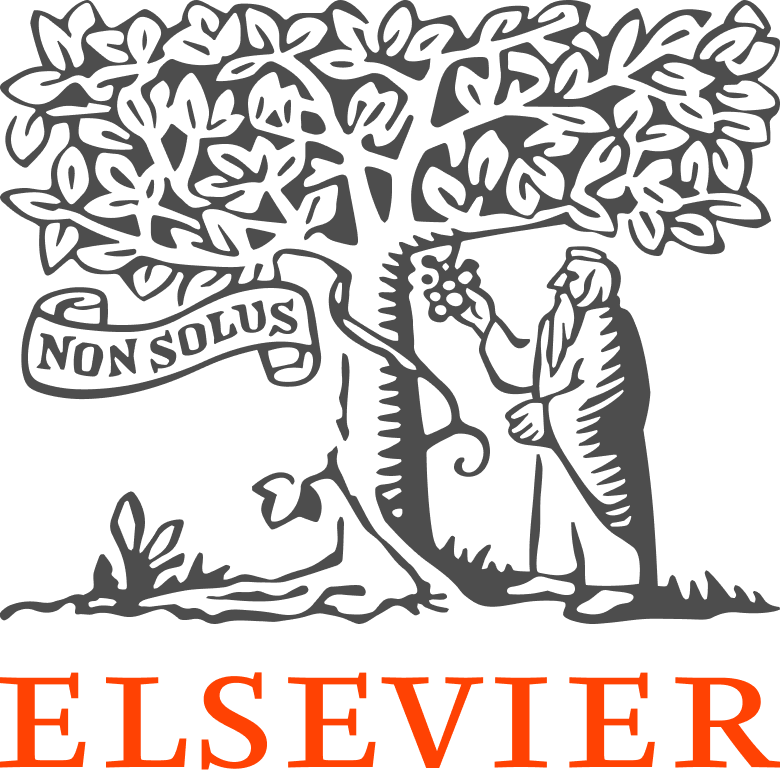How Can We Help?
Content filtering with filtersContent filtering with filters
For each endpoint in the web-service you can configure which data will be available from the end-point with a number of filters.
A word of warning!
All of the settings mentioned in these pages are found in the Administrator tab > Security
When you enter these pages you will see this warning:

Please take this seriously, you have the option to open for all content in Pure for web service users if you disable the filters in the web service.
Some basic information about how filters work with the web service
Filters are combined to find the result
The filters can affect the same content in different ways. If there is a conflict between filters and one (or more) filter says the content can be shown, but another filter says not, the content will not be shown.
An example:
A Research Output has the visibility free (Public - No restriction), but is in the workflow step "Entry in progress".
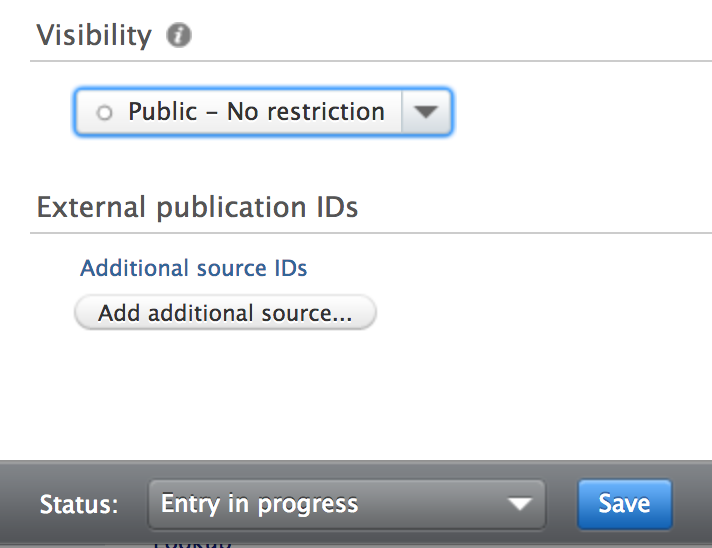
With the defaultLimitedVisibilityCSF and limitToLastStepWorkflowCSF enabled, then the defaultLimitedVisibilityCSF filter will allow the content in the API but the limitToLastStepWorkflowCSF will block the content because it is not in the last workflow step, and since one of the filters says no, the content will not be shown.
Each endpoint has its own filter configuration for anonymous and authenticated
An endpoint can be required to be authenticated. When this is switched to On you need to provide both a username/password and a valid API key to use the endpoint.
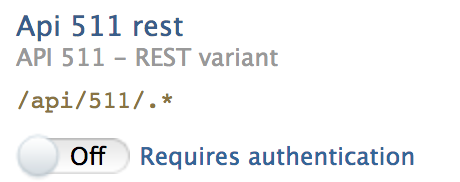
The filters on each endpoint can be enabled or disabled for authenticated or anonymous users, so that you can set up different filter combinations depending on if the web service call includes a valid user name/password or not.
Please note that if you are using an API key created as an admin key, the filters used are always those configured as authenticated even if no user name/password is provided.
Filters that cannot be disabled in Pure
These filters cannot be disabled in Pure since they are essential for ensuring License agreements and confidentiality.
The filters will be marked with a blue bar, indicating that they cannot be changed.

associationContentServiceFilter
This filter will hide incomplete bidirectional associations. This could be relevant if, for instance, a reference in the association is marked as confidential, then the association should be hidden.
E.g. If a project has a link to a confidential research output, and the web service API key is not a administrator account, then you can not see the link to the research output on the project.
confidentialityContentServiceFilter
This filter will hide content marked as confidential.
Note
If the API key is an administrator account, and the defaultLimitedVisibilityCSF filter is disabled, then confidential content is also exposed for this API key, even with the confidentiality filter in place. We recommend that you only use administrator accounts when necessary.
externalableLicensingContentServiceFilter
This filter hides all fields that have external licensing, which has not been accepted.
According to the Scopus and WoS (Web of Science) license, certain fields (abstract etc.) from the databases may be stored in Pure but not shown to the public e.g. on Portals and web services.
See also Scopus as self import source
Filters that can be configured
These filters can be enabled or disabled for each endpoint in the web service.
dataSetDocumentEmbargoNowDateCSF
See electronicVersionEmbargoNowDateCSF for embargo information.
This filter removes information about files attached to datasets, it they are inside the embargo period.
This filter should be used with versionedDocumentEmbargoNowDateCSF and electronicVersionEmbargoNowDateCSF to cover all attached file types.
defaultAccessExtensionCSF
This filter will hide electronic versioned files, DOIs, links and additional files based on open access status. This filter works in conjunction with the filters "defaultLimitedVisibilityCSF" and "electronicVersionEmbargoNowDateCSF".
The content in question is exposed based on the following ruleset:
- Within campus IP range: Access status must be: OPEN, EMBARGOED or RESTRICTED
- Outside campus IP range: Access status must be: OPEN or EMBARGOED
In both cases, if EMBARGOED the embargo filter determines the access.
defaultLimitedVisibilityCSF
This filter will hide content which is not visible. A content can be visible by visibility state 'FREE' or by a user coming from a campus IP-range and the visibility state of the content is 'CAMPUS'.
Note
If this filter is turned OFF and requests are made with a user which can read confidential content, this confidential content is ALSO exposed. I.e. a request performed by an administrator user can expose ALL confidential content.
electronicVersionEmbargoNowDateCSF
When a file/document is attached to metadata in Pure, you have the option to set an embargo date for the file, and during the embargo period the file will not be shown outside Pure.
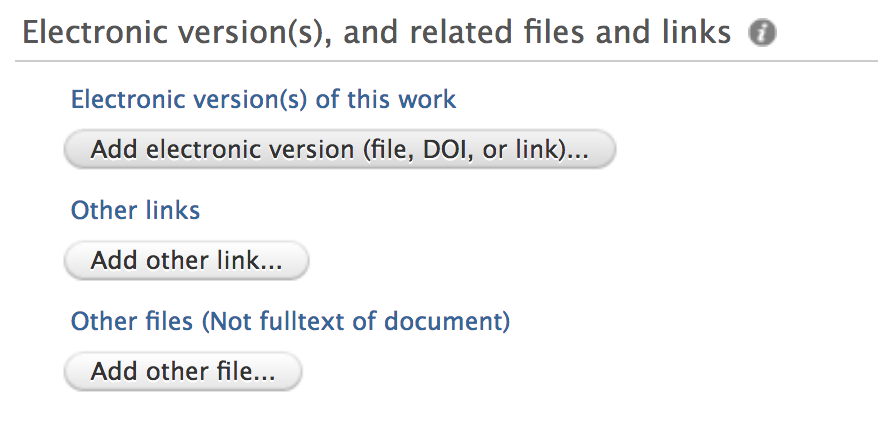
First you have to decide if it is an Electronic version file or an Other document.
And then you can set an embargo period where applicable.
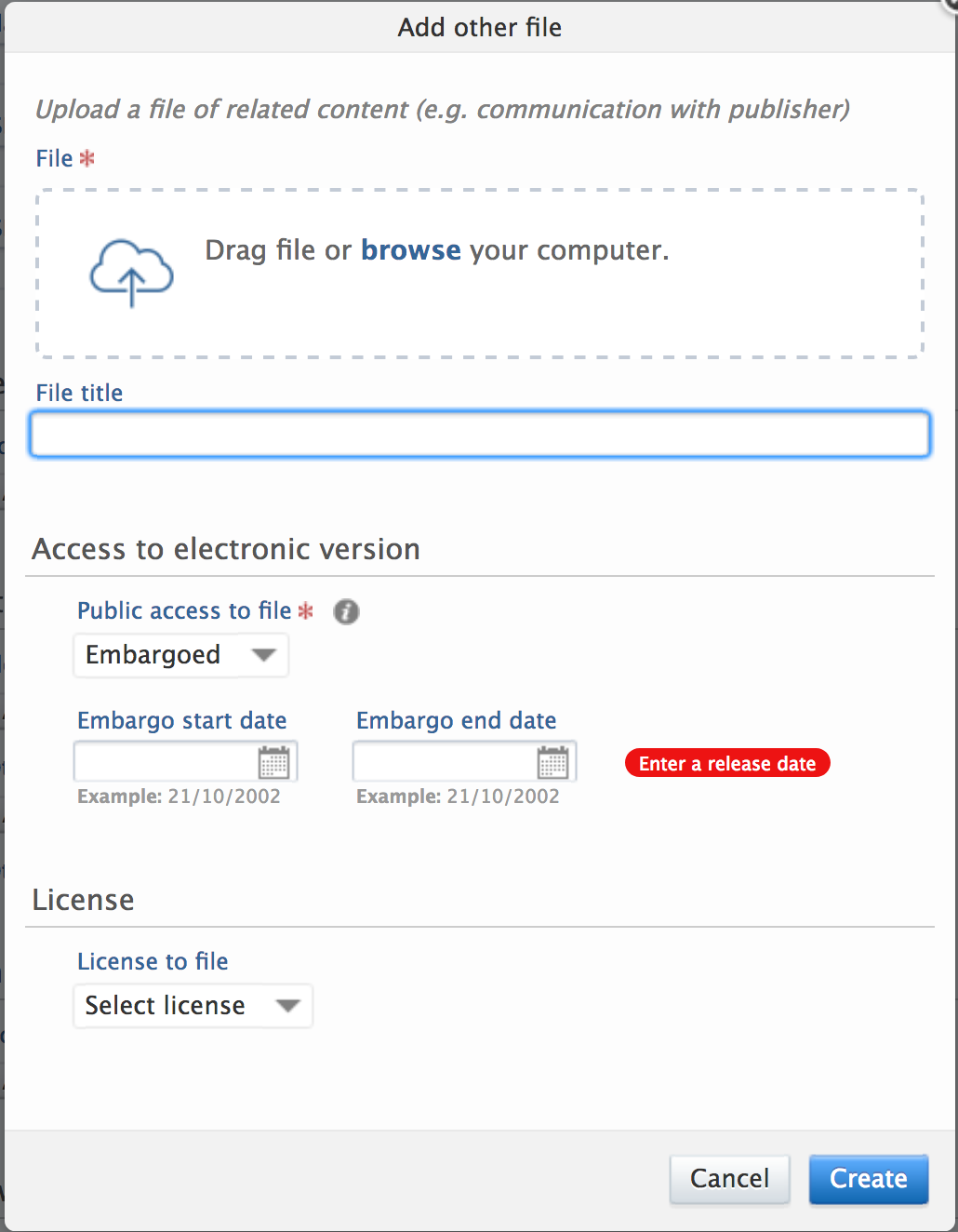
This filter then uses this information to remove information about files of the type electronic versions that are currently inside the embargo period.
This filter should be used with versionedDocumentEmbargoNowDateCSF and dataSetDocumentEmbargoNowDateCSF to cover all attached file types.
filterRemoteOriginCSF
This filter will hide content which is considered of remote origin.
Content is considered to be of remote origin if it has no relations to an internal organizational unit, but only have relations to persons.
This is normally content created by a researcher in a previous position, which has been entered in Pure to be able to make a complete CV or web profile.
keywordGroupsContentServiceFilter
This filter will hide keywords that should not be visible to the current user.
Inside Pure under Administrator > Keywords, you can add keyword groups to the content types, and when adding the keywords you can select which roles the keywords should be limited to.
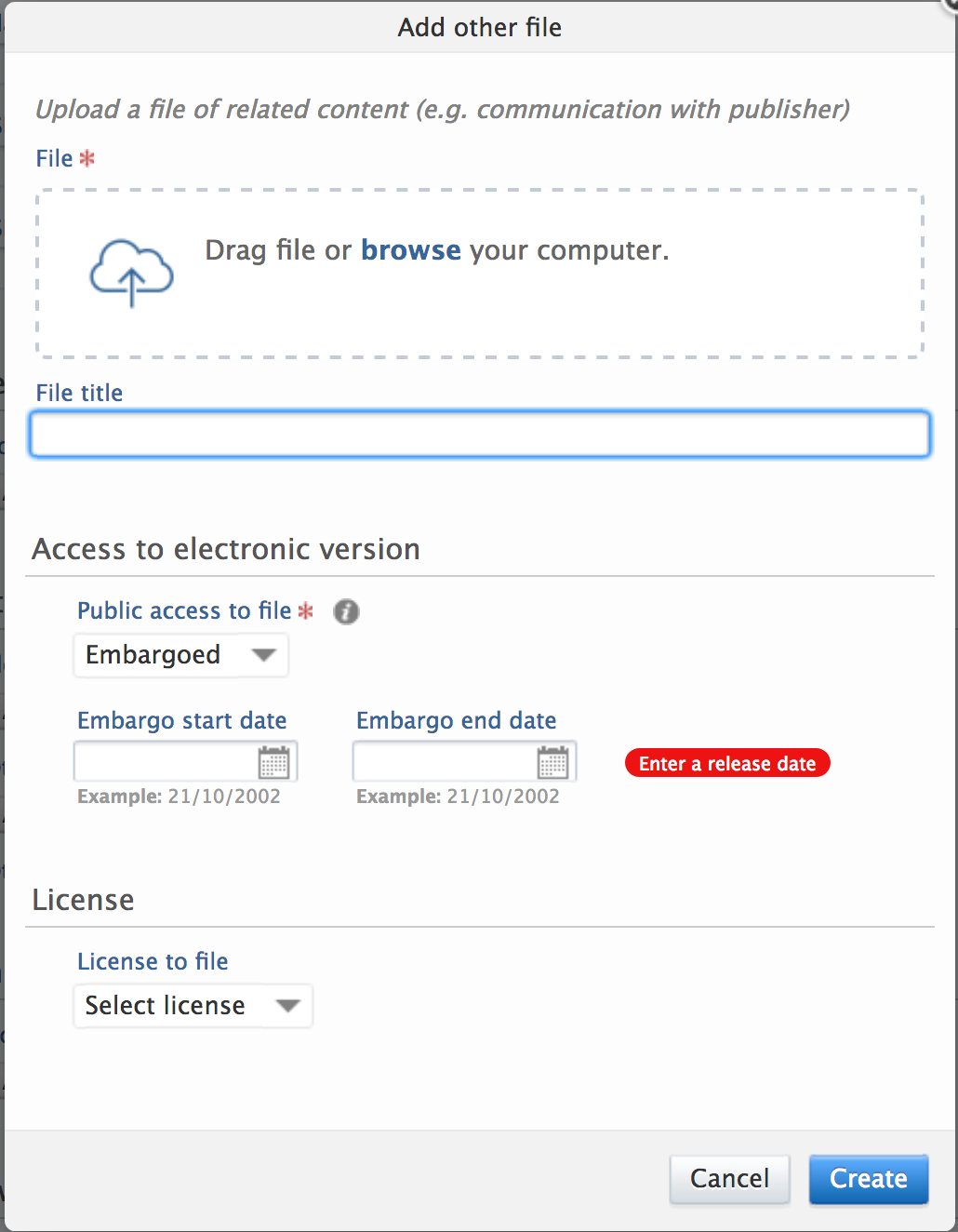
If this filter is enabled, you will need to access the web service with a user which has the appropriate roles to see the keywords.
limitPublicationToLastWorkflowStepAllowingRemoteOriginCSF
This filter will hide content not in last workflow step, unless it is considered of remote origin.
Content is considered to be of remote origin, if it has no relations to an internal organization, but only have relations to persons.
This is normally content created by a researcher in a previous position, which has been entered in Pure to be able to make a complete CV or web profile.
if used with limitToLastStepWorkflowCSF, this filter is will be ignored, so you should use either limitToLastStepWorkflowCSF or limitPublicationToLastWorkflowStepAllowingRemoteOriginCSF but never both at the same time.
limitToLastStepWorkflowCSF
This filter hides content based on the current workflow step. Content not in the last workflow step is hidden.
You should use either limitToLastStepWorkflowCSF or limitPublicationToLastWorkflowStepAllowingRemoteOriginCSF but never both at the same time.
localizedStringContentServiceFilter
This filter replaces non-translated properties on a content with translated ones, taken from any translated language. This filter can have a performance impact, since each value potentially will be looked up multiple times until a matching local is found.
This filter is only relevant in Pure installations where you can submit content in multiple languages e.g. Danish and English.
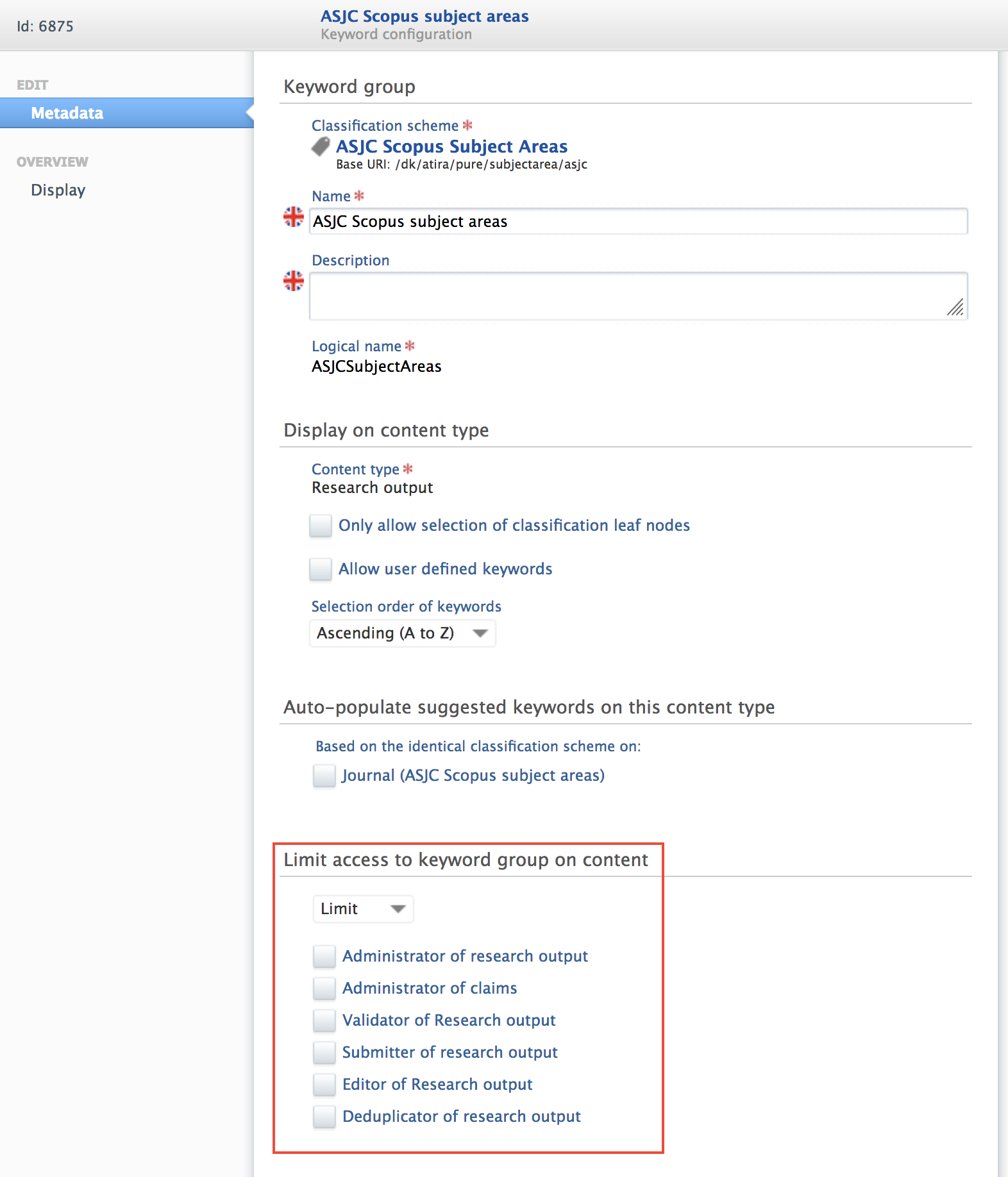
If this filter is enabled and you request this content in locale English you will get
- Title: Danish title
- Subtitle: a subtitle is always nice to have
- if you request this content in locale Danish you will get
- Title: Dansk title
- Subtitle: a subtitle is always nice to have
So even though the Danish subtitle is empty, you will get the value from the English translation.
You should consider to use "fallbackLocale" in the API when you need this feature rather than enabling this filter, as it can be quite confusing when the content comes out as a mix of languages.
versionedDocumentEmbargoNowDateCSF
Filter files on Student Thesis based on based on embargo date
See electronicVersionEmbargoNowDateCSF for embargo information.
This filter will hide all files on Student Theses which are currently embargoed.
This filter should be used with dataSetDocumentEmbargoNowDateCSF and electronicVersionEmbargoNowDateCSF to cover all attached file types.
Filters that are only available to some locale data models
Beside the filters above, there are a few other filters that are only available to some locale data models, like studenterprojekter on the Danish data model.
If you seen any of these filters and have questions about this, please contact the Pure support team.
Published at November 05, 2025
